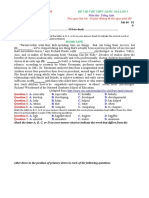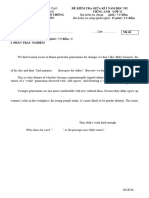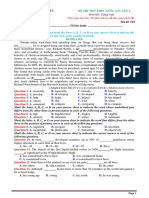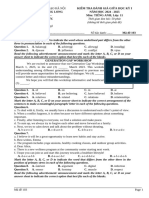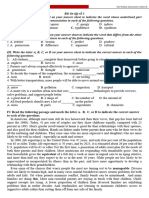ĐỀ KT GIỮA KÌ I MÃ 003
ĐỀ KT GIỮA KÌ I MÃ 003
Uploaded by
kimdungkieuCopyright:
Available Formats
ĐỀ KT GIỮA KÌ I MÃ 003
ĐỀ KT GIỮA KÌ I MÃ 003
Uploaded by
kimdungkieuCopyright
Available Formats
Share this document
Did you find this document useful?
Is this content inappropriate?
Copyright:
Available Formats
ĐỀ KT GIỮA KÌ I MÃ 003
ĐỀ KT GIỮA KÌ I MÃ 003
Uploaded by
kimdungkieuCopyright:
Available Formats
SỞ GIÁO DỤC VÀ ĐÀO TẠO HÀ NỘI KIỂM TRA GIỮA KỲ I - NĂM HỌC 2024 - 2025
TRƯỜNG THPT THỌ XUÂN Môn: TIẾNG ANH, Lớp 10
ĐỀ CHÍNH THỨC Thời gian: 60 phút (Không kể thời gian phát đề)
(Đề thi có 05 trang)
Mã đề thi
Họ và tên thí sinh:.............................................................................. SBD:..................... 003
Read the following passage and mark the letter A, B, C, or D on your answer sheet to indicate the correct answer to
each of the questions.
Family routines set out how families organise themselves to get things done, spend time together and have
fun. Routines help family members know who should do what, when, in what order and how often. Routines
also let your children know what’s important to your family.
Routines can bring children several benefits. Routines can be part of an organised and predictable home
environment, which helps children and teenagers feel safe and looked after. And a
predictable family life can also help children cope during development changes like puberty or life events like
the birth of a new child, divorce, illness or a house move. Also, routines built around having fun or spending
time together develop a sense of belonging and strengthen family relationships. For example, your routine
might include things like reading a story together before bed each night, sharing regular family meals, or
having a kick with your child before soccer practice every week.
Having chores as part of family routines helps children and teenagers develop a sense of responsibility and
some basic skills like time management. These are what children can use for life. And when children can do
their parts of the routine with less help or supervision, it also helps them become more independent.
Routines can help younger children to learn healthy habits, like brushing their teeth, taking medicine
regularly, doing physical activity, or washing their hands after using the toilet. This means that routines can be
good for children’s health. For example, children who wash their hands more regularly might be less likely to
get colds and other common illnesses. Also, routines can reduce stress, and lower stress is good for children’s
immune systems.
Question 1. Which of the following can be the best title for the passage?
A. The Importance of Family Routines
B. Organizing Family Time Effectively
C. Developing Healthy Habits in Children
D. Building Strong Family Relationships
Question 2. The word ‘predictable’ in paragraph 2 is closest in meaning to _________.
A. uncertain B. planned C. random D. unstable
Question 3. According to paragraph 2, which of the following is NOT mentioned as an example of a family
routine?
A. reading a story together before going to bed each night
B. having regular family meals
C. participating in soccer practice every week
D. taking turns doing household chores
Question 4. The word ‘basic’ in paragraph 3 is closest in meaning to _________.
A. additional B. unnecessary C. primary D. unimportant
Question 5. According to paragraph 3, what skills can children develop through doing chores as part of family
routines?
A. creativity and time management B. responsibility and time management
C. independence and communication skills D. physical strength and responsibility
Question 6. According to paragraph 3, which of the following is TRUE about chores?
A. Chores are a burden for children and teenagers.
B. Chores enable children to develop independence.
Trang 1/5 - Mã đề 001
C. Chores should be removed from family routines.
D. Chores have no impact on children’s development.
Question 7. The word ‘these’ in paragraph 3 refers to ________.
A. skills B. chores C. routines D. teenagers
Question 8. According to paragraph 4, which of the following is NOT mentioned as a healthy habit that
younger children can learn through routines?
A. brushing their teeth B. taking medicine regularly
C. eating vegetables D. washing their hands after using the toilet
Question 9. Which of the following can be inferred from the passage?
A. Routines are only important for younger children, not teenagers.
B. Family routines help children deal with major life changes.
C. Children who have routines are more likely to get sick.
D. Independent children do not require any help or supervision in their routines.
Question 10. Which of the following is NOT true about routines according to the passage?
A. Routines promote healthy habits in children.
B. Routines are unnecessary for building strong family relationships.
C. Routines help children cope with changes in family life.
D. Routines teach children responsibility and life skills.
Read the following passage and mark the letter A, B, C, or D to indicate the correct word or phrase that best
fits each of the numbered blanks.
Plastic bags are a big problem for our oceans. Many people use plastic bags every day, but when they are
thrown away, they often end up in the sea. This happens because (11) _________. They can float in the water
for a long time and travel far from (12) __________. In the ocean, (13) _____. For example, turtles might
mistake plastic bags for jellyfish and eat them. This can make the turtles sick or even kill them. Fish and other
sea creatures can also get tangled in plastic bags, (14) ________. Moreover, as plastic bags break into tiny
pieces, they turn into microplastics, (15) __________ can spread throughout the ocean and mix with the water.
This makes the water dirty and unsafe for all sea animals. (16) _________, we can use fewer plastic bags and
choose reusable bags instead. By doing this, we can help keep our oceans clean and protect the animals that
live there. Small changes in our habits can make a big difference for the environment.
Question 11.
A. plastic bags are not easy to break down B. plastic bags are easy to be broken down
C. it takes a fortnight to break down plastic D. it needs several days to be broken down
Question 12.
A. where they were thrown away B. which they throw away
C. where they are thrown away D. which they are throwing away
Question 13.
A. plastic bags can cause serious harm to sea animals
B. plastic bags can do serious harm to landfill animals
C. plastic bags cannot cause serious harm to the ocean
D. plastic bags can do seriously harm to ocean creatures
Question 14.
A. which will protect them B. that is hurting or killing them
C. that is going to protect them D. which can hurt or kill them
Question 15.
A. That tiny pieces B. This small piece
B. These tiny pieces D. Those small piece
Question 16.
A. Helping solve that problem B. To help solve this problem
Trang 2/5 - Mã đề 001
C. Helped solve that problem D. To helping solve this problem
Read the following passage and mark the letter A, B, C or D on your answer sheet to indicate the correct
option that best fits each of the numbered blanks.
Based on the original The Voice of Holland, The Voice of America, or sooner The Voice, officially aired
on NBC on April 26, 2011 aiming to find new singing talent and soon became a big hit.
The Voice process includes Blinds Audition, Battles Rounds, Knockout Rounds, and the final live
performance phase. Only those fifteen and over are eligible for the competition. There are four coaches,
themselves well-known performing artists, who critique contestants' performances and form their own teams of
contestants and give them guidance through the rest of the season. Coaches also have the power to decide on
which contestants to advance in the next rounds. One celebrity key advisor gives assistance to the coaches and
their teams during the preparation process.
The coaches and the television audience have equal power to decide who moves on to the final four phase.
However, the winner is determined by votes from the television audience by online voting on the official
website, SMS text and iTunes stores purchases of the contestants' performances. The declared winner receives
US$ 100, 000 and a record contract with Universal Music Group.
As an incredible success in both Holland and the U.S., The Voice has been franchised out to many other
countries in the world, and has been a big rival to the Idol franchise.
Question 17: What is TRUE about The Voice program?
A. It originated in Holland. B. The Voice of Holland first aired on NBC.
C. It was a failure in Holland. D. The Voice of Holland first aired on BBC.
Question 18: What is a requirement for contestants?
A. Contestants must be over 10 old. B. Contestants must be at least 15 years old.
C. Contestants must be at least 13 years old. D. Contestants must be over 30 years old.
Question 19: Who decide on the winner of each season?
A. Coaches and television audience B. Coaches and the celebrity key advisor
C. Television audience D. The contestants' parents.
Question 20: By what means can people vote for their favourite contestant?
A. Text messages, internet, and post letters
B. Youtube views and online voting on the official website
C. Facebook’s sharing and voting from the audiences.
D. Text messages and online buying of the contestants' performances
Question 21: What is the prize for winning a The Voice season?
A. A music company and US$ 100,000
B. A large amount of money and becoming a The Voice coach
C. A record contract worth US$ 100,000
D. A large amount of money and chance to work with a music company
Mark the letter A, B, C, or D on your answer sheet to indicate the word whose underlined part differs from
that of the other three in pronunciation in each of the following questions.
Question 22. A. prepare B. respect C. children D. strengthens
Question 23. A. adopt B. protect C. carbon D. Produce
Mark the letter A, B, C, or D on your answer sheet to indicate the correct arrangement of the sentences to
make a meaningful paragraph/letter in each of the following questions.
Question 24.
a. Besides, doing chores together can actually be fun and it makes the work go faster.
b. Dear Mike, I hope you are well! I've been thinking about why it's important for children to help with
housework.
c. It's a good may for families to spend time together and learn new skills.
d. Firstly. it teaches us responsibility and how to take care of our ow n things.
e. Also. when we help our parents, it shows them respect and gratitude for all they do for us.
f. Best wishes.
A.b__a__e__d__f B.b__d__e__a__c__f
C.b__a__d__e__c__f D.b__e__d__a__c__f
Trang 3/5 - Mã đề 001
Question 25.
a. I came back to Bangkok but I still remember your school spring fair.
b. Dear Xuan,
c. Thank you for having invited me to the fair. I’ll never forget the event in my life.
d. I liked the songs and games, but the dish called “Cha Gio” made a deep impression on me.
e. I am now staying on a farm to help my uncle collect grapes.
A. a__b__e__d__c B. b__e__a__c__d
C. b__e__a__d__c D. a__c__e__e__b
Mark the letter A, B, C, or D on your answer sheet to indicate the word that differs from the other three in
the position of stress in each of the following questions.
Question 26. A. breadwinner B. laundry C. homemaker D. routine
Question 27. A. invest B. major C. perform D. machine
Read the following advertisement/school announcement and mark the letter A, B, C, or D on your answer
sheet to indicate the correct option that best fits each of the numbered blanks from 29 to 30.
Dear students,
We are excited to announce that our annual school fair will (28) ___________ on Friday, February 2nd,
2024.
The fair will start at 9:00 AM and end at 4:00 PM.
There will be a variety of games, food (29) _________, and performances for everyone to enjoy. We
encourage all students to participate and make this event a success.
Please note, (30) ____________ it rain on February 2nd, the fair will be postponed to the following
Question 28. A. be celebrated B. celebrate C. celebrating D. have celebrated
Question 29. A. riots B. supplies C. stalls D. carts
Question 30. A. should B. had C. were D. if
Mark the letter A, B, C, or D to indicate the word(s) CLOSEST in meaning to the underlined word(s) in each
of the following sentences.
Question 31. Judges travel all round America in search of the best singer and bring them to Hollywood.
A. Look for B. Remove from
C.Similar to D. Identify with
Question 32. Electric cars are better for the environment. In addition, they can save money on petrol
A. In conclusion B. For example
C.Nevertheless D. Furthermore
Mark the letter A, B, C, or D to indicate the word(s) OPPOSITE in meaning to the underlined word(s) in each
of the following sentences.
Question 33. After a very short time, this kind of music becomes wildly popular among the youth.
A. appealing B. attractive C. unknown D. common
Question 34. To an American, success is the result of hard work and self-reliance.
A. devotion B. industry C. laziness D. enthusiasm
Mark the letter A, B, C, or D on your answer sheet to indicate the correct answer to each of the following
questions.
Question 35. It costs a lot of money to have a famous singer at your party.
A. perform B. Performing C. to perform D. Performed
Question 36. Andy plays the violin well, __ the trumpet is his favorite instrument.
A. So B. Nor C. But D. For
Question 37. SPACESPEAKERS Group is _______ search of new rappers to collaborate in their new MV.
A. on B. at C. for D. in
Question 38. Gold _______in California in the 19th century.
A. Was discovered B. Has been discovered C. Was discover D. Discovered
Question 39. I hope we our natural resources better in the future.
A. Will protect B. Should protect C. Have protected D. Are going to protect
Question 40. Using electrical increases the amount of carbon dioxide in the air.
A. Household appliances B. Greenhouse gas
C. Green lifestyle D. Global temperature
Question 41. I ____ my parents at the weekend. I already bought a train ticket.
Trang 4/5 - Mã đề 001
A. visit B. am going to visit C. visited D. will visit
Question 42. When all members of the family share housework, family__become stronger.
A. joys B.happiness C.Life D.Bonds
Question 43. I'm busy right now because I __________ for the exam.
A. study B. studied C. studying D. am studying
Question 44. It’s 7.00 p.m. now and we ____ meal together. We usually ____ dinner at that time.
A. have - eat B. have - are eating C. are having – eat D. are having -are eating
Question 45. Kindness and responsibility are two___________ that many parents want to teach to their
children.
A. family values B. customs C. cultures D. ideas
Question 46. Maria decided ______ her education after a gap year.
A. to continue B. to continuing C. continue D. continuing
Question 47. You’d better ____ out with your friends as it is very dangerous in the evening.
A. went B. go C. going D. to go
Read the following advertisement/school announcement and mark the letter A, B, C, or D on your answer
sheet to indicate the correct option that best fits each of the numbered blanks from 48 to 50.
GO GREEN CLUB
We are happy to announce that our school is starting a new club: Go Green Club!
Here are some things we (48) __________ in the club:
• Plant trees and flowers: We will plant trees and flowers around the school to help the environment.
Recycle paper and plastic: We will collect paper and plastic and (49) __________ them to reduce waste.
• Learn about the environment: We will learn about the environment and how we can help protect it.
If you want to join the Go Green Club, come to Room 12 on Friday at 3 pm. We can't wait (50) __________
you there!
Question 48.
A.will do B. are going to do C. would do D. should do
Question 49.
A. protect B. recycle C. estimate D. calculate
Question 50.
A. seeing B. see C. too seeing D. to see
-------------- THE END --------------
Trang 5/5 - Mã đề 001
You might also like
- 20 ĐỀ THI THỬ TIẾNG ANH TRƯỜNG CHUYÊN THPT QUỐC GIA MỚI NHẤT KÈM LỜI GIẢI CHI TIẾT !Document316 pages20 ĐỀ THI THỬ TIẾNG ANH TRƯỜNG CHUYÊN THPT QUỐC GIA MỚI NHẤT KÈM LỜI GIẢI CHI TIẾT !OriNo ratings yet
- Test 1Document8 pagesTest 1minh buiNo ratings yet
- Đọc Điền Khuyết Thông Tin TEST - 5Document7 pagesĐọc Điền Khuyết Thông Tin TEST - 5honganhbao1412No ratings yet
- 20 de Thi TNTHPT Quoc Gia Co Dap An Va Loi Giai Chi TietDocument463 pages20 de Thi TNTHPT Quoc Gia Co Dap An Va Loi Giai Chi TietTịch MịchNo ratings yet
- 20 de Thi TNTHPT Quoc Gia Co Dap An Va Loi Giai Chi TietDocument428 pages20 de Thi TNTHPT Quoc Gia Co Dap An Va Loi Giai Chi TietThanh HàNo ratings yet
- de-giua-ky-1-tieng-anh-11-nam-2023-2024-truong-thpt-le-hong-phong-quang-namDocument8 pagesde-giua-ky-1-tieng-anh-11-nam-2023-2024-truong-thpt-le-hong-phong-quang-namhuynhdanggiahung622008No ratings yet
- 32. Đề. Sở Ninh Bình - 2023Document4 pages32. Đề. Sở Ninh Bình - 2023Ti HíNo ratings yet
- ÔN TẬP GK 1. ANH 11Document4 pagesÔN TẬP GK 1. ANH 11hanguyen3288hhtNo ratings yet
- 11GK1 24-25 - Ta - 514Document4 pages11GK1 24-25 - Ta - 514maingocttNo ratings yet
- GK1_K11Document4 pagesGK1_K11Trương Gia BảoNo ratings yet
- 11GK1 24-25 - Ta - 512Document4 pages11GK1 24-25 - Ta - 512maingocttNo ratings yet
- ĐỀ ÔN THI GIỮA KÌ grade 11Document19 pagesĐỀ ÔN THI GIỮA KÌ grade 11Nhân ĐỗNo ratings yet
- JKDocument463 pagesJKQuỳnh NhiNo ratings yet
- 20 Đề Thi Thử THPT Quốc Gia Tiếng Anh Trường Chuyên Có Đáp Án Và Lời GiảiDocument510 pages20 Đề Thi Thử THPT Quốc Gia Tiếng Anh Trường Chuyên Có Đáp Án Và Lời GiảiNguyễn Thị Ngọc Tâm 11A-20No ratings yet
- 42 1110n THPT Hon DatDocument3 pages42 1110n THPT Hon Dat6jsscgx4mbNo ratings yet
- ANH KC ĐỀ 485Document7 pagesANH KC ĐỀ 485Tra GiangNo ratings yet
- Đáp án đề khảo sát chất lượng môn tiếng anh lớp 12 - năm 2023-2024Document6 pagesĐáp án đề khảo sát chất lượng môn tiếng anh lớp 12 - năm 2023-2024erlingnguyen2000No ratings yet
- De GK 1 - TA 11 - Ma de 112 ff170Document4 pagesDe GK 1 - TA 11 - Ma de 112 ff170Nguyeenx Ngojc UyeenNo ratings yet
- De 123Document4 pagesDe 123Dung Lại ThùyNo ratings yet
- F THPT HÔNG LĨNH - FORM MINH HỌA 2025Document8 pagesF THPT HÔNG LĨNH - FORM MINH HỌA 2025Phan Gia BảoNo ratings yet
- TRAC NGHIEM ON TAP GIUA HK1 Tieng Anh 11Document4 pagesTRAC NGHIEM ON TAP GIUA HK1 Tieng Anh 11vosonghuong883No ratings yet
- De GK 1 - TA 11 - Ma de 114 cc52dDocument4 pagesDe GK 1 - TA 11 - Ma de 114 cc52dNguyeenx Ngojc UyeenNo ratings yet
- 06. ĐỀ THI THỬ TN THPT 2023 - MÔN TIẾNG ANH - THPTHàn Thuyên - Bắc Ninh - Lần 1 (Bản word có lời giải chi tiết)Document18 pages06. ĐỀ THI THỬ TN THPT 2023 - MÔN TIẾNG ANH - THPTHàn Thuyên - Bắc Ninh - Lần 1 (Bản word có lời giải chi tiết)Giomy KyoNo ratings yet
- 11GK1 24-25 - Ta - 513Document4 pages11GK1 24-25 - Ta - 513maingocttNo ratings yet
- De Giua Ky 1 Tieng Anh 11 Nam 2024 2025 Truong THPT Yen Lac Vinh PhucDocument10 pagesDe Giua Ky 1 Tieng Anh 11 Nam 2024 2025 Truong THPT Yen Lac Vinh Phuchohuyhoanghhh2011No ratings yet
- Đề GK1 - TA11 - lghDocument13 pagesĐề GK1 - TA11 - lghVương BíchNo ratings yet
- Bắc Ninh Mã 204Document7 pagesBắc Ninh Mã 204Ánh NgọcNo ratings yet
- ÔN TẬP GK 1. ANH 11Document4 pagesÔN TẬP GK 1. ANH 11hanguyen3288hhtNo ratings yet
- Ma de 105Document4 pagesMa de 105Thu UyênNo ratings yet
- Tieng Anh 11 de Cuong Giua Ky 1 23 24Document7 pagesTieng Anh 11 de Cuong Giua Ky 1 23 24QuaNo ratings yet
- 11GK1 24-25 - Ta - 511Document4 pages11GK1 24-25 - Ta - 511maingocttNo ratings yet
- ÔN TẬP THI KHẢO SÁT CHIỀUDocument4 pagesÔN TẬP THI KHẢO SÁT CHIỀUwilliamhannah32No ratings yet
- ĐỀ SỞ THÁI NGUYÊNDocument6 pagesĐỀ SỞ THÁI NGUYÊNThuyy DonggNo ratings yet
- TRAC NGHIEM ON TAP GIUA HK1 Tieng Anh 11Document7 pagesTRAC NGHIEM ON TAP GIUA HK1 Tieng Anh 11hoatran01No ratings yet
- Thời gian làm bài: 60 phút, 50 câu trắc nghiệmDocument37 pagesThời gian làm bài: 60 phút, 50 câu trắc nghiệmMinh PhanNo ratings yet
- DE CUONG GK1-K11-24-25Document15 pagesDE CUONG GK1-K11-24-25sinhle7464No ratings yet
- U2. Test 1Document5 pagesU2. Test 1Ly HươngNo ratings yet
- (11 Chuyên) Đề cương Tiếng Anh - Giữa kỳ 1 năm học 24-25.bản inDocument18 pages(11 Chuyên) Đề cương Tiếng Anh - Giữa kỳ 1 năm học 24-25.bản inTrà MyNo ratings yet
- Practice testDocument4 pagesPractice testPhuong Thao NguyenNo ratings yet
- De GK 1 - TA 11 - Ma de 113 d554cDocument4 pagesDe GK 1 - TA 11 - Ma de 113 d554cNguyeenx Ngojc UyeenNo ratings yet
- Unit 2 - Test 1 - KeyDocument4 pagesUnit 2 - Test 1 - KeyPhạm Mơ100% (1)
- DE On Thi HK2 ANH 11 GLOBAL SUCCESS de 3Document13 pagesDE On Thi HK2 ANH 11 GLOBAL SUCCESS de 3ngocanhtran2233No ratings yet
- Trac NghiemDocument9 pagesTrac NghiemNguyễn PhongNo ratings yet
- Đề TN-Anh-chuyen-quoc-hoc-hue-lan-1-nam-2017Document9 pagesĐề TN-Anh-chuyen-quoc-hoc-hue-lan-1-nam-2017phamxthuongNo ratings yet
- 20 de Thi TNTHPT Quoc Gia Co Dap An Va Loi Giai Chi TietDocument304 pages20 de Thi TNTHPT Quoc Gia Co Dap An Va Loi Giai Chi TietnguyenngocquynhchiNo ratings yet
- Ma de 103Document4 pagesMa de 103Thu UyênNo ratings yet
- De On Tap Giua HK1 Tieng Anh 11 Global de 1Document3 pagesDe On Tap Giua HK1 Tieng Anh 11 Global de 1ttruonganh310No ratings yet
- Ta de Cuong On Tap Giua Hki Khoi 11 2024 2025 - 24920247Document7 pagesTa de Cuong On Tap Giua Hki Khoi 11 2024 2025 - 24920247tathimy373100% (1)
- De Cuong On Tap Giua Hoc Ky 1 Tieng Anh 10 Nam 2024 2025 THPT Yen HoaDocument30 pagesDe Cuong On Tap Giua Hoc Ky 1 Tieng Anh 10 Nam 2024 2025 THPT Yen Hoanhuynh007No ratings yet
- De Cuong On Tap Giua Hoc Ky 1 Tieng Anh 10 Nam 2024 2025 THPT Yen HoaDocument30 pagesDe Cuong On Tap Giua Hoc Ky 1 Tieng Anh 10 Nam 2024 2025 THPT Yen HoaLinh NguyễnNo ratings yet
- Trường Thpt Chuyên Đề Kiểm Tra Đg Cuối Học Kỳ I Năm Học 2021 - 2022 Môn Tiếng Anh - Lớp 11 (Chung) Mã đề thi: 111Document4 pagesTrường Thpt Chuyên Đề Kiểm Tra Đg Cuối Học Kỳ I Năm Học 2021 - 2022 Môn Tiếng Anh - Lớp 11 (Chung) Mã đề thi: 111Nguyên Hà NguyễnNo ratings yet
- P23,24 - Revision For Mid-Term TestDocument5 pagesP23,24 - Revision For Mid-Term TestPham HoaNo ratings yet
- S L NG Sơn Năm 2024Document33 pagesS L NG Sơn Năm 2024baonhu290806No ratings yet
- De GK 1 - TA 11 - Ma de 111 1db44Document4 pagesDe GK 1 - TA 11 - Ma de 111 1db44Nguyeenx Ngojc UyeenNo ratings yet
- K11 - EXTRA W2 - Reading - Word Form - HSDocument5 pagesK11 - EXTRA W2 - Reading - Word Form - HSTRAN THI KIM NGANNo ratings yet
- KBC11 HkiDocument8 pagesKBC11 HkilinhntdNo ratings yet
- Berufskolleg Fachhochschulreife Englisch Baden-Württemberg: Übungsaufgaben zum Hörverstehen nach dem neuen FHSR 2023-FormatFrom EverandBerufskolleg Fachhochschulreife Englisch Baden-Württemberg: Übungsaufgaben zum Hörverstehen nach dem neuen FHSR 2023-FormatNo ratings yet
- Spark a Revolution in Early Education: Speaking Up for Ourselves and the ChildrenFrom EverandSpark a Revolution in Early Education: Speaking Up for Ourselves and the ChildrenNo ratings yet
- Practical Solutions to Practically Every Problem: The Survival Guide for Early Childhood ProfessionalsFrom EverandPractical Solutions to Practically Every Problem: The Survival Guide for Early Childhood ProfessionalsNo ratings yet
- XPANDED EDUCATION FOR THE PAPERLESS SOCIETY by NAM JUNE PAIKDocument2 pagesXPANDED EDUCATION FOR THE PAPERLESS SOCIETY by NAM JUNE PAIKLau DattoliNo ratings yet
- Curriculum Guide in MapehDocument3 pagesCurriculum Guide in Mapehcondeno83% (23)
- Vidi AquamI Saw Water (Sprinkling Rite For Easter Season) - 4Document4 pagesVidi AquamI Saw Water (Sprinkling Rite For Easter Season) - 4Ronilo, Jr. CalunodNo ratings yet
- Music of TWLDocument13 pagesMusic of TWLnicomaga2000486No ratings yet
- Active Listening - Making Music Book by AbletonDocument3 pagesActive Listening - Making Music Book by Abletoneanicolas100% (1)
- Elizabeth's Theme - Bioshock InfiniteDocument2 pagesElizabeth's Theme - Bioshock Infiniteusername_available100% (3)
- Q1 Grade 9 Music DLL Week 1Document8 pagesQ1 Grade 9 Music DLL Week 1Nazame NayukiNo ratings yet
- Untitled Spreadsheet - Sheet2Document1 pageUntitled Spreadsheet - Sheet2SariaNo ratings yet
- Jingle Bell Rock SAXO ALTODocument1 pageJingle Bell Rock SAXO ALTOLuna FlorezNo ratings yet
- Conquest of Paradise Sheet MusicDocument5 pagesConquest of Paradise Sheet MusicJohnny Espinosa50% (2)
- Bikaner Updated FileDocument213 pagesBikaner Updated FilevandyNo ratings yet
- SSD Ea 1 3 Music LecturerDocument50 pagesSSD Ea 1 3 Music LecturerAbdelkaderBenbadaNo ratings yet
- 3 Music M.A.Hindustani Music Tabla SyllabusDocument21 pages3 Music M.A.Hindustani Music Tabla SyllabussidtreatNo ratings yet
- Scientific Pitch Notation - WikipediaDocument1 pageScientific Pitch Notation - Wikipediaphonon77No ratings yet
- Music Literature and Appreciation (Music 173/3)Document4 pagesMusic Literature and Appreciation (Music 173/3)grace garciaNo ratings yet
- Vaughan Williams: The English Song Series - 3Document21 pagesVaughan Williams: The English Song Series - 3John SmithNo ratings yet
- Moon River Classical Music PDF & - Takeuchi - Tìm V I GoogleDocument5 pagesMoon River Classical Music PDF & - Takeuchi - Tìm V I GoogleNguyen Tuan KhoaNo ratings yet
- Last Partial LEARNING ENGLISH SCHOOLDocument6 pagesLast Partial LEARNING ENGLISH SCHOOLaycos2No ratings yet
- Francisco Santiago Antonio J. Molina: Title of Any Composition Title of Any CompositionDocument4 pagesFrancisco Santiago Antonio J. Molina: Title of Any Composition Title of Any CompositionCedelyn Labador BolañosNo ratings yet
- 2002songsheet Songsandchantsforthegoddess Dragonfest2002Document12 pages2002songsheet Songsandchantsforthegoddess Dragonfest2002Bhone KhantNo ratings yet
- Bach - BWV - 1001-1006 BarocklauteDocument186 pagesBach - BWV - 1001-1006 Barocklautebbqyxfs64qNo ratings yet
- Etta James - All I Could Do Was CryDocument1 pageEtta James - All I Could Do Was CryLili Nagy0% (1)
- WikiDocument77 pagesWikilauravhernandez123456No ratings yet
- Items - RunechalksDocument2 pagesItems - RunechalksGonzalo RodriguezNo ratings yet
- BBC Symphony Orchestra Professional: User ManualDocument23 pagesBBC Symphony Orchestra Professional: User ManualUlianov MarínNo ratings yet
- (AoR) Takeover at Whisper Base (Beginner's Game)Document28 pages(AoR) Takeover at Whisper Base (Beginner's Game)kekoch100% (1)
- Sigur RosDocument2 pagesSigur RoshhalpinNo ratings yet
- Drum Fills For 4-4 Rock & Funk SAMPLEDocument2 pagesDrum Fills For 4-4 Rock & Funk SAMPLEMarcos LeoneNo ratings yet
- Harlem Renaissance Thesis IdeasDocument7 pagesHarlem Renaissance Thesis Ideasmichelethomasreno100% (2)
- M84 Bass Fuzz Deluxe: 92503011755 RevaDocument2 pagesM84 Bass Fuzz Deluxe: 92503011755 RevaDaniel DekkerNo ratings yet
